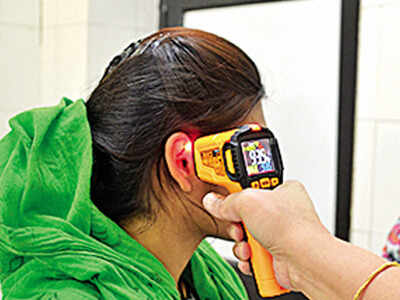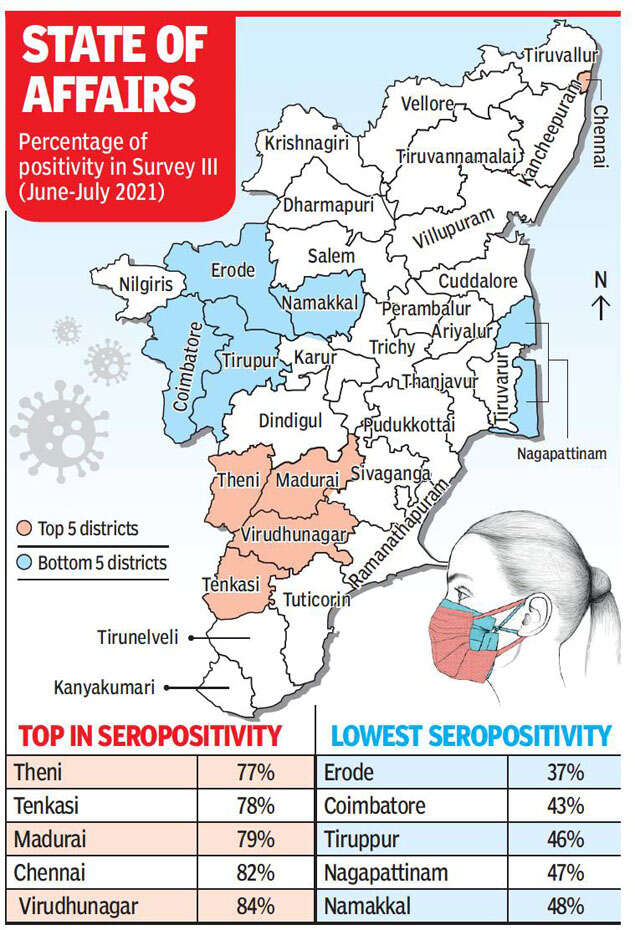Top Searches
- News
- City News
- chennai News
- Serosurvey a dose of hope, but Tamil Nadu cautious
Serosurvey a dose of hope, but Tamil Nadu cautious

Picture used for representational purpose only
CHENNAI: More than three-fifths of the people in Tamil Nadu have antibodies that will offer higher protection against the virus that causes Covid-19.
While epidemiologists, virologists and public health authorities are now hopeful of seeing fewer hospital admissions and deaths, they stress there are multiple reasons why neither the state nor the people can let their guard down.

First, since seroprevalence isn’t a uniform figure, even high prevalence districts aren’t completely safe yet. “Moving without masks is still not an option anywhere in the state,” said R Sunderraman, public health expert and former director of the National Health Systems Resource Centre. “We can say that Chennai is relatively safe since more than 80% of its people have the antibodies. But not all of Chennai is safe. An apartment block or the neighbourhood a person lives in or their workplace have a seropositivity of just 20%. In that case, there can be a micro epidemic there,” he said.
This means, those who are not vaccinated, particularly the elderly and others with comorbid conditions, continue to face a high amount of risk.
“The rule in general is to wear at least one mask and maintain social distance. For additional protection, one can use a double mask in crowded areas and closed spaces. Elderly and those with poor health conditions, who are yet to be vaccinated may need N95,” said senior virologist Dr Jacob John.
Experts also suggest that in areas with lower seropositivity rate vaccinations should be high priority. “Vaccinations will not stop transmission, but there is enough evidence to show it will certainly bring down deaths,” said senior epidemiologist Dr Jayaprakash Muliyil, who is also a part of the state task force on Covid. “So, the state must ensure everyone receives at least one dose of the vaccine,” he said.
The state, he said, should use these results as evidence to unlock colleges and schools. “There could be a rogue mutant that may take us back to square one. But that is not a good enough reason for us to force children to stay at home,” Muliyil said. “We should pin our hopes on the antibodies we have developed against the disease,” he said.
Even if the antibodies wane with time, the biological memory response will be able to respond quickly when a person is re-infected. And this will mitigate the severity of disease, he said.
Infectious diseases experts such as Dr Subramanian Swaminathan, however, say they are not so sure. “The high seropositivity is mostly induced by natural infection and not vaccines,” he said. The seropositivity dropped between October 2020 and April this year because infection immunity did not last, he said. “We don’t know the future,” he said.
Director of Public Health Dr TS Selvavinayagam agrees. “This is a new virus. We saw cases go up in April, when antibodies came down. Another rogue mutation can also make things worse,” he said.
The priority should be to increase vaccinations and prevention and preparedness measures in districts with lower antibody levels, said ICMRNational Institute of Epidemiology director Dr Manoj V. Murhekar.
While epidemiologists, virologists and public health authorities are now hopeful of seeing fewer hospital admissions and deaths, they stress there are multiple reasons why neither the state nor the people can let their guard down.

First, since seroprevalence isn’t a uniform figure, even high prevalence districts aren’t completely safe yet. “Moving without masks is still not an option anywhere in the state,” said R Sunderraman, public health expert and former director of the National Health Systems Resource Centre. “We can say that Chennai is relatively safe since more than 80% of its people have the antibodies. But not all of Chennai is safe. An apartment block or the neighbourhood a person lives in or their workplace have a seropositivity of just 20%. In that case, there can be a micro epidemic there,” he said.
This means, those who are not vaccinated, particularly the elderly and others with comorbid conditions, continue to face a high amount of risk.
“The rule in general is to wear at least one mask and maintain social distance. For additional protection, one can use a double mask in crowded areas and closed spaces. Elderly and those with poor health conditions, who are yet to be vaccinated may need N95,” said senior virologist Dr Jacob John.
Experts also suggest that in areas with lower seropositivity rate vaccinations should be high priority. “Vaccinations will not stop transmission, but there is enough evidence to show it will certainly bring down deaths,” said senior epidemiologist Dr Jayaprakash Muliyil, who is also a part of the state task force on Covid. “So, the state must ensure everyone receives at least one dose of the vaccine,” he said.
The state, he said, should use these results as evidence to unlock colleges and schools. “There could be a rogue mutant that may take us back to square one. But that is not a good enough reason for us to force children to stay at home,” Muliyil said. “We should pin our hopes on the antibodies we have developed against the disease,” he said.
Even if the antibodies wane with time, the biological memory response will be able to respond quickly when a person is re-infected. And this will mitigate the severity of disease, he said.
Infectious diseases experts such as Dr Subramanian Swaminathan, however, say they are not so sure. “The high seropositivity is mostly induced by natural infection and not vaccines,” he said. The seropositivity dropped between October 2020 and April this year because infection immunity did not last, he said. “We don’t know the future,” he said.
Director of Public Health Dr TS Selvavinayagam agrees. “This is a new virus. We saw cases go up in April, when antibodies came down. Another rogue mutation can also make things worse,” he said.
The priority should be to increase vaccinations and prevention and preparedness measures in districts with lower antibody levels, said ICMRNational Institute of Epidemiology director Dr Manoj V. Murhekar.
FacebookTwitterLinkedinEMail
Start a Conversation
end of article

